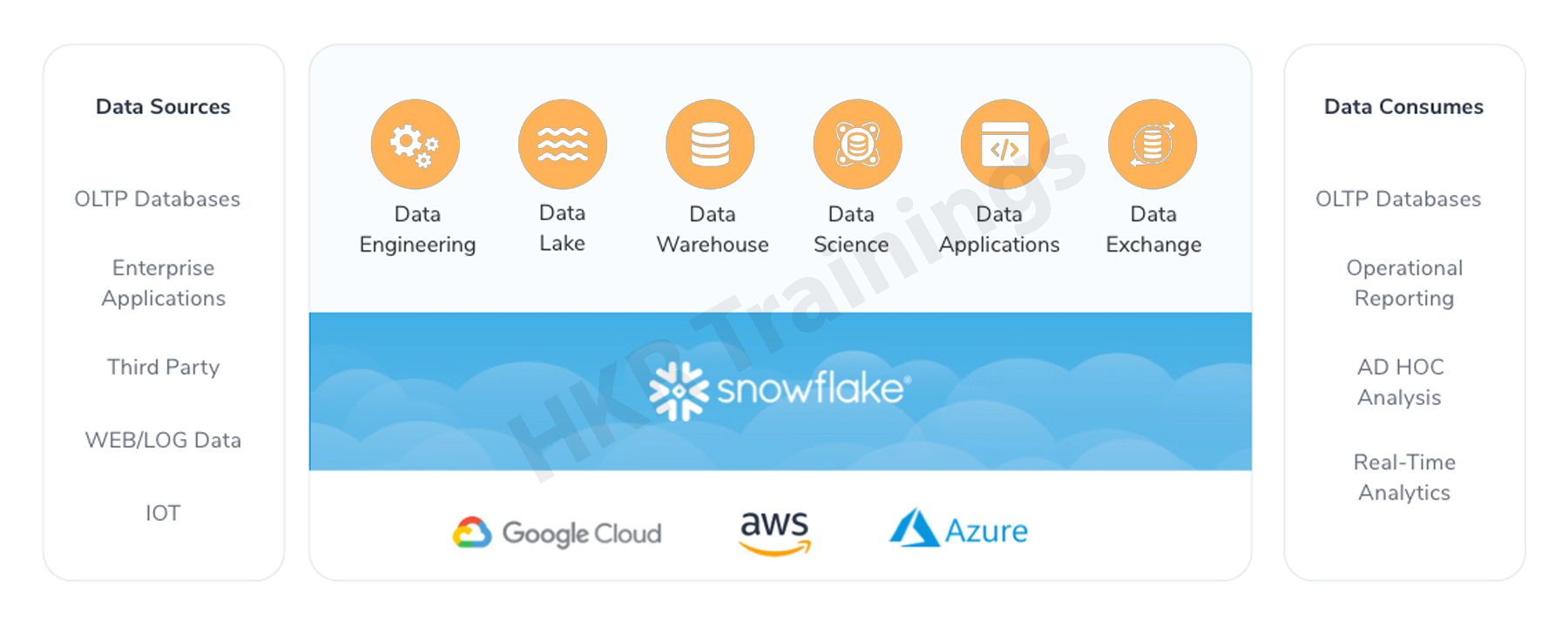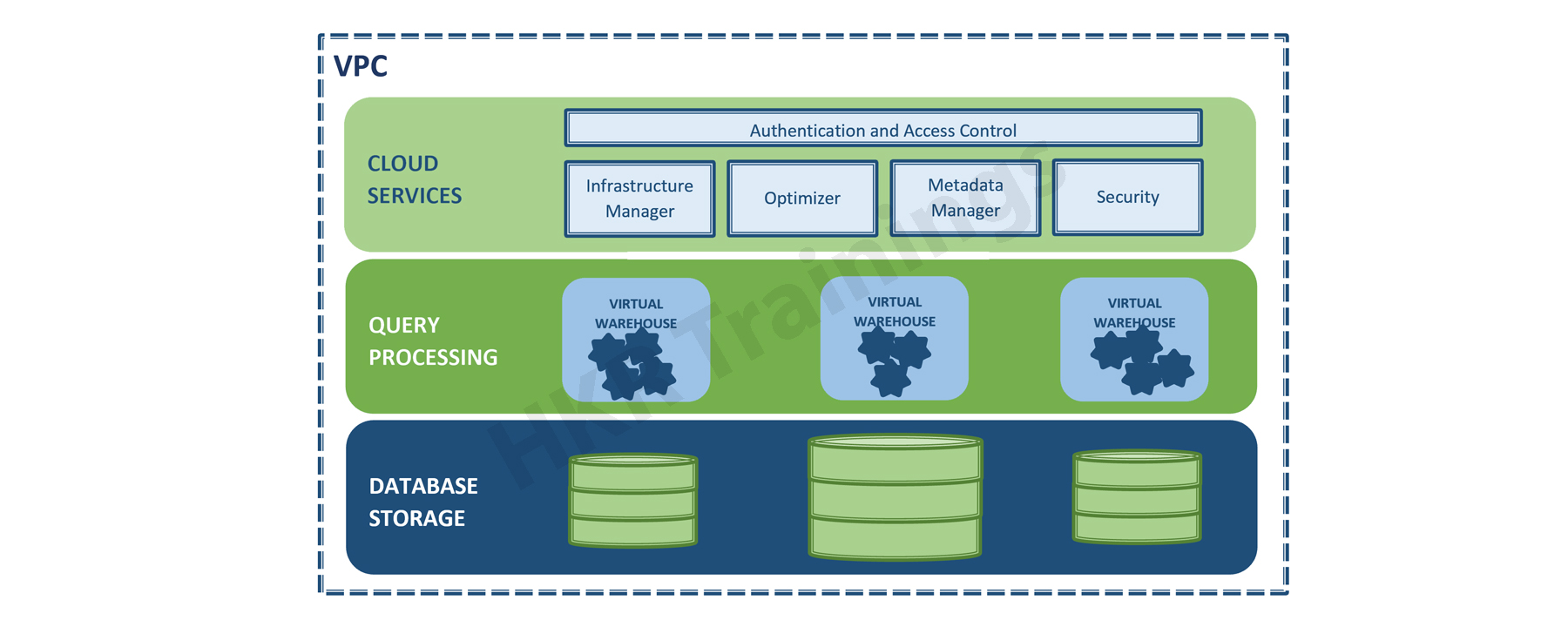Snowflake Data Cloud
Last updated on Jul 15, 2024
Snowflake data cloud - Table of Content
- Introduction to the Snowflake data cloud
- Overview of the Snowflake data cloud
- Architecture and Components of the Snowflake data cloud
- Benefits of the Snowflake data cloud
- Final take
Introduction to the Snowflake data cloud
Snowflake data cloud is a powerful data warehouse management platform. It is not an addition to already existing data warehouse management platforms. Snowflake data cloud is built on top of various cloud services such as Amazon web services, Microsoft Azure, and GCP (Google cloud platform) infrastructure. One more interesting thing about Snowflake data cloud is that this platform doesn’t require any installation prerequisites like hardware or software components to select, configure, or manage. With the help of the Snowflake data cloud, it’s easy to move the data into the ETL (extract, transfer, and load) process.
Become a Snowflake Certified professional by learning this HKR Snowflake Training!
Overview of the Snowflake data cloud
Snowflake data cloud is a cloud-based data warehouse management company located in Montana. It was founded in July 2012, officially launched in October 2014 as a public service company. Snowflake data cloud is built on top of various cloud technologies such as Amazon web service, Microsoft Azure, and Google cloud platform (GCP) infrastructures. It is one of the popular data platforms which operates as a cloud data warehouse and offers services like data lakes, data warehousing, and cloud storage.

Snowflake data cloud is a powerful warehouse tool and provides a wide range of services like data integration, BI (business intelligence), advanced data analytics, security, and governance. It also supports programming languages like Go, Java, and Python. Amazon web service uses the SnowFlake to access the SQL (structured query language) database with an architecture specially designed for the cloud engine. Snowflake is organized in terms of computing units and can be used in different levels, for example from small to 4Xlarge.
The Snowflake Architecture consists of the three basic components they are;
- Database storage
- Query processing
- Cloud services
Let’s learn them one by one; first will start with database storage ;
1. Database storage:
At the storage level, there is a cloud database storage available that consists of the shared disk (this is for storing the persistent data) and shared-nothing (this is for MPP massive parallel processing of queries with the portions of data stored locally entities). Before storing the data in a columnar format, ingested data should be optimized. Snowflake data cloud manages the data ingestion, compression, and storage.
*Note: this stored data in the disk cannot be used directly by a user, but it can only be accessed by SQL queries.
2. Query processing:
Next is the Query processing level, which is where the SQL (structured query language) queries will be executed. All the SQL queries are a part of a specific cluster that consists of several compute nodes (Which can be customizable) and they will be executed in the MPP environment. These MPPs environments are also known as Virtual data warehouses. Now it has become quite common to have a data warehouse for an individual business like sales, finance, and marketing. This type of setup is a bit expensive but offers the best services like data integration, and data analytics.
3. Cloud services:
this is the final step of the Snowflake data cloud environment. It offers a bunch of services that help tie together the different units of cloud environments ranging from data security or access data control to infrastructure and data storage management.

Snowflake Training
- Master Your Craft
- Lifetime LMS & Faculty Access
- 24/7 online expert support
- Real-world & Project Based Learning
Architecture and Components of the Snowflake data cloud
The following image illustrates the Architecture of the snowflake data cloud;


Subscribe to our YouTube channel to get new updates..!
Data platform workloads in Snowflake data cloud:
Snowflake data cloud offers a single unified data platform to manage all data-related tasks. The data platform includes the following workloads;
- Data engineering: Snowflake data cloud platform supports a wide range of data integration and tools processing that enables the capacity to deploy the virtual data warehouses in milliseconds and scale the computing power for ETL (extract, transfer, and load) style in data engineering. There is a performance tuning option also available so it is a low-maintenance platform and charges apply as per your usage of the tool.
- Data Lake: where data lake failure gave a bad name for the Hadoop technology so we can say that Cloud-based warehouse platforms are a clear winner here. The snowflake data cloud platform is a combination of infinite compute power and unlimited data storage capacity that enables users to access the data in SQL query format that making the platform the best data lake tool.
- Data warehouse: snowflake data cloud is a leader in data warehouse management as per the Gartner report. This is because of the following reasons Low maintenance administration tool Ability to ingest, transform, and query data in a real-time environment.
-
Data science: Snowflake cloud data is a terrific solution in data science this is because scaling up the virtual warehouse and processes the terabytes of data. These combined solutions enable the data with machine learning and ease delivery of the solutions.
-
Data application: Snowflake data cloud is the only solution that solves the problems like solution architect delivering data-intensive applications and massive concurrency scale. This cloud platform delivers an excellent performance in spite of thousands of queries.
-
Data exchange: Snowflake data cloud has the ability to share, and exchange the data within the subsidiaries, third-party vendors, and partners. It also facilitates live access to ready-t0-query the data within a few clicks.
Top 30 frequently asked snowflake interview questions & answers for freshers & experienced professionals
Benefits of the Snowflake data cloud
The following are the few benefits of the Snowflake data cloud;
- Management and metadata: Snowflake data cloud is an independent data warehouse management tool that manages the metadata, optimizes the data delivery, and security.
- A computing platform: it provides multiple, independent computing clusters to process the queries.
- Provides a world-class data storage capacity: there is a cloud data storage available that consists of the shared disk which helps to store teh persistent data. Snowflake data cloud also manages ingestion, compression, and storage.
- No limit on the number of consumer accounts with which a data set may be shared.
- Get access to the data without any need to move or transform it.
- Query and combine shared data with existing data or join together data from multiple publishers.
Get ahead in your career with our Snowflake Tutorial!
Final take
Our main aim is to develop the snowflake cloud data article is to help those who want to pursue their career in the data warehouse management field. Why do you want to know about the snowflake data cloud? The reason is, it is one of the powerful cloud data management platforms, that offers data computing on various popular cloud technologies such as Amazon web service, Microsoft Azure, and Google cloud platform (GCP). In this article, we have tried to explain the basic to core concepts to enable our audience to master the snowflake data cloud. We always try to keep up with our audience’s expectations and try to deliver the best technology-related blogs.
Related Articles:
About Author
A technical lead content writer in HKR Trainings with an expertise in delivering content on the market demanding technologies like Networking, Storage & Virtualization,Cyber Security & SIEM Tools, Server Administration, Operating System & Administration, IAM Tools, Cloud Computing, etc. She does a great job in creating wonderful content for the users and always keeps updated with the latest trends in the market. To know more information connect her on Linkedin, Twitter, and Facebook.
Upcoming Snowflake Training Online classes
| Batch starts on 24th Feb 2026 |
|
||
| Batch starts on 28th Feb 2026 |
|
||
| Batch starts on 4th Mar 2026 |
|
FAQ's
Snowflake is a cloud-based self-managed service that implements and manages all three layers on a cloud platform.
Snowflake's cloud data supports a wide range of data workloads, from data warehousing to data science and application. Moreover, it is a cloud data warehouse that stores and analyzes multiple data records in a single place.
Snowflake is a cloud-based platform and an AWS partner that offers various software solutions. Further, its cloud data platform can quickly deploy on the AWS platform.
Snowflake offers faster, more scalable, accessible, and more flexible data processing and storage solutions than traditional ones. Its cloud platforms' infrastructure offers and allows storage and computing to scale separately. These cloud platforms include- GCP, AWS, and Microsoft Azure Cloud.
Snowflake usage is better for those companies looking for easy deployment of a data warehouse solution. It consists of features like unlimited auto-scaling with a high-performance ratio. On the other hand, Azure also offers good data warehousing with good performance.


